- Home
- Alex Archer
Solomon's Jar Page 5
Solomon's Jar Read online
Page 5
“We’ll go get help,” she told the circle of pale surprised faces turned toward her. “Come on, Eric.”
The protesters crowded in on the fallen pair. The man Annja had kidney punched sat on his knees, moaning. The other lay with a trickle of blood running down his stubbled slab cheek; he had either broken a tooth or bitten his tongue, and was in all events stunned. As the artists and craftspersons all pushed together, jostling and trying to outshout each other with knowledgeable-sounding advice, Annja grabbed the Englishman’s wrists and they were off again, running ahead and to the left.
“Eric?” he demanded. He wasn’t hanging back this time.
“Improvising!” she said.
She turned her head enough for her peripheral vision to register that at least two men pursued them along the left-hand edge of the crowd. The commotion she had caused with the pair she had dropped was serving as a strange attractor for much of the crowd now. Everybody else seemed to be looking that way, even the disgruntled orator and the mime.
“What are we going to do now?” the Englishman asked as they darted free of the crowd, heading for the stone steps, now vacated by the tour boat passengers, who had wandered off down a side street toward one of the local attractions.
“Commandeer a ride,” she said.
“Commandeer? You mean steal?” He sounded outraged.
“Whatever. Would you rather get to know the mafiya up close and personal?”
Heavy footsteps drummed the pavement behind her. A large flock of pigeons took off in a panicky flight from the top of the canal wall.
“You go negotiate passage for us,” Annja said, propelling him down the steps with a hand between the shoulders. The boat driver, a young man with dark blond hair hanging lank from beneath a billed cap, looked up, his mouth agape beneath the gold ring in his nose.
She turned. Two new Russians slowed to a heavy-breathing stop three yards away and began walking toward her with broad grins.
“You gave us a good run, miss,” said the taller of the two, walking straight toward her. He had a gold incisor and a startling Aussie accent overlaying the Russian. “Now the show’s over.”
She punched him. Hard. She threw a good, straight right, putting her hips into it, driving with her legs, putting all the force she was capable of up the bones of her arm and through the last three knuckles of her fist into his face. She felt cartilage squash and blood squirt, as if she’d punched a fruit. The man sat down hard and fluids began to flow.
His partner was all over her from her right side, trying for a bear hug. She reached up, grabbed a handful of padded shoulder and, putting her right hip hard into his groin, cartwheeled him right over her shoulder. It could easily have been a death stroke, but she wasn’t ready for that. Rather she pulled him in so that instead of smashing the back of his skull to pulp on the stone of the pier he slammed down on the top of his back. The air exploded out of him, and she thought she felt his shoulder pop free of the socket. What a shame, she thought with a grin.
The other guy was rubbing his face, trying to clear his eyes of tears and the scarlet sparks that the pain from his nose were doubtless still shooting through his forebrain. Her own nose panged in sympathy. She leaped down the six feet to the landing, flexing her legs to take the shock.
Her companion stood arguing with the tour boat pilot. Both turned to gape at her. She hopped onto the boat, said, “Sorry,” to the young boatman and pushed him straight over the gunwales. He landed in the water, limbs flailing, and threw up a giant wave of stinking green water.
“Let’s go,” she said, revving the engine and grabbing the tiller.
The Brit stood still staring openmouthed at her. She got the boat’s prow turned upstream, away from the pursuit, and accelerated. He windmilled his own arms. She had to grab the front of his shirt to keep him from flying over the stern.
She dragged him to a seated position. From behind a ripple of gunfire crashed as one of their pursuers opened up from the concrete railing. Bullets sent miniature geysers spouting white behind the churn of their propeller. Then they were through the round arch of the next bridge down.
Her companion was staring at her with eyes and hair wild. His shirttail had been pulled out of his jeans. His hands were plucking and pushing at it as if to tuck it in again, but he didn’t seem to have good command over them.
“Are you quite sure you’re not some covert government agent?” he shouted at her.
“Yep.”
“You’re daft!”
“Pretty much,” Annja replied laughing.
Something cracked right above their heads.
THE SOUND WAS MORE like something breaking than a pop. It was something breaking, Annja knew instantly: the sound barrier. Someone had fired a high-velocity round at them.
She reached out, grabbed her companion by the shoulder and pitched him facedown to the deck before he could react. Then she looked back.
The Russians were living up to their reputation for dogged determination. Three of them had hijacked a canal boat of their own and were speeding in their quarry’s wake. Two of them were standing up, risking a nasty high-speed spill into the murky waters of the canal, firing handguns at them.
She turned her eyes forward just in time to swerve through an archway of another bridge rather than accordion themselves on a piling. With her free hand Annja grabbed the young man by the collar and hauled him to a seated position. Ahead she could see the masts of sailboats and a long, low, rust-colored barge cruising slowly past the canal mouth.
She felt a sharp pang of yearning for her sword. She was aware, all too aware, it couldn’t help her here. She couldn’t slice bullets out of the air with it, and anyway, the middle of a densely populated city was not the place to pluck a sword from thin air and start waving it around. She knew that through her wit and will alone she would prevail or fail.
“What now?” the young man asked.
Good question. The last bridge was coming up fast. The Russians were closing, though still a good hundred yards back. Annja undid her belt, yanked it off, leaned over, did something fast and purposeful. Then she threw both arms around him.
“Take a deep breath,” she said.
THE RUSSIANS DUCKED low as their boat flashed beneath the final bridge. Ahead of them their quarry wallowed and then began to turn right in the slow but heavy crosscurrent.
“We got them!” one of the men crouching in the bow shouted triumphantly.
His comrade, less intrepid, had gone all the way to his knees. “Wait!” he shouted over the whine of their engine. “Where did they go?”
The smaller boat rolled as it cruised out into the IJ. The standing man toppled and barely prevented himself from going into the estuary.
“It’s empty!” he shouted.
The water flattened around them in a sudden downdraft. Above them they heard the sound of a helicopter rotor.
And from the quay behind they heard the distinctive, angry voice of their leader.
BOBBING TO THE SURFACE in the dark shadow of the archway, the young man shook his head like an angry terrier.
“You’re daft!” he exclaimed. “You’re mad. Barking bloody mad!”
Treading water beside him Annja looked out into the IJ. The pursuing boat had cut its engine and was drifting sideways as its impromptu crew put their hands in the air. A harbor patrol helicopter hovered above them.
“It worked, though,” she told him.
She swam back to the upstream side of the bridge and climbed onto the small concrete pier. She reached out a hand to help her companion from the water. He shook her off angrily and sprang out. He was fairly fit, she realized—agile. Plus he’d mostly kept up with her, although unlike her he was breathing hard.
He followed her into a side street. “We’ve got to go to the authorities,” he told her.
She shrugged. “Your call. It might take you longer than you like to answer to their satisfaction the questions they’re going to ask. And our friends, ther
e—” she bobbed her head back toward the canal, clearly indicating their erstwhile mafiya pursuers “—are known for having tentacles deep into police forces all over the world.”
“But there are surveillance cameras everywhere!” he exclaimed, waving his hand toward one mounted on a metal post beneath a lantern with a crown surmounting it. It seemed to stare at them like an idiot eye.
“They’ve got them all over your country, too,” she said, “and street crime’s skyrocketing there.”
He made an inarticulate noise compounded of frustration, disgust and reaction. He held up his hands before his dripping, anger-pink face and shook them. “Don’t,” he said, “follow me. We’re done. Understand?”
“Have it your way,” she said. She resisted the temptation to call, “You’re welcome” after him as he stomped off down a side street. Instead she began looking around.
Something tells me, she thought, I need to get out of Holland fast.
THE LITTLE BOXY rental car was parked with its snub snout almost touching one of the three-foot metal stanchions that studded most of the sidewalks to protect pedestrians from vehicles and also to keep the drivers off the sidewalks. Valeriy Korolin stood before it, arms akimbo, glaring into the estuary with the tails of his sports coat flapping in a brisk breeze that smelled of fish, stale saltwater and diesel fumes.
“Now look what you fools have done,” he said. “What possessed you to shoot at them? This is Amsterdam, not Tbilisi.”
“But Captain,” said one of the two men who’d piled from the car with him. “They killed the shopkeeper.”
“Fool! Did you see any blood on them?”
“Well, no—”
Around them sirens blared. “Did you fail to notice,” the captain said, voice razor edged with sarcasm, “that the interior of the storeroom looked as if someone had set off a grenade in a can of red paint? Haven’t you ever beaten anybody to death before, Gena?”
“Well, yes, comrade Captain. But—”
“It’s not ‘comrade’ anymore, you buffoon. And quit calling me Captain!”
“This is the police!” a polite but brisk electronically amplified voice called out.
The car had been surrounded by Amsterdam police cars, white with red-and-blue hashmarks on their sides. Either presuming that anybody making such a commotion in Amsterdam must be a Yankee, or simply playing it safe since most Netherlanders and most tourists understood some English, the officer spoke that tongue. “Put your hands behind your heads.”
“All right, all right,” Korolin called. He turned to face the nervous pair of cops approaching behind drawn handguns. They held their weapons as if expecting they might suddenly turn and bite them, like vipers. “I am Colonel Sergei Arbatov, of the Russian Federal Security Bureau’s Anti-Terrorism Task Force. You will find my identification in my right inside coat pocket. Please permit me to speak to your superior at once!”
6
Still breathing easily after a brisk two-mile ride, mostly uphill, Annja swung off the bicycle before the gateway to the manor house. Red brick gateposts rose from pale granite bases. The gate had a black wrought-iron arch across it with a tree worked in the center and painted white. The gates themselves stood open. A brass plaque, on the near upright, kept polished to a bright yellow, read Ravenwood Manor—The White Tree Lodge.
The sun hung low over green hills to the west. The clouds, strung across the sky like clots of cream, had toward the horizon begun to take on evening tints of cream and gold below, pale blue and dove-gray above. The hills were fairly sharp for England, though their outlines were softened by grass and copses of trees. They stretched west from the ancient Cinque Ports town of Hythe, bounding the fabled Romney Marsh. The Kentish Channel coast had become heavily encrusted with urbanization, especially since the building of the underwater chunnel from Featherstone, and the green countryside of Kent as a whole had been reduced by the encroachment of suburbs and bedroom towns from London.
The hill rose in a gentle slope toward a big white house on the crest. An immaculately tended crushed-shell drive curved subtly up through an equally compulsively manicured lawn, as uniformly green as a carpet. Annja saw no formal garden around the three-story Georgian house. Rather it stood amid a stand of trees, big ashes and vast, spreading oaks with massive, bent, cracked-bark trunks, themselves probably older than the nearly three centuries the house had stood. They masked several outbuildings, at least one of substantial size, which stood behind the great house on the back slope.
She took a drink of water from the bottle clipped to the bicycle frame. Then she swung a long, lithe leg over the seat and started pedaling up the hill. She felt no fatigue, only a bit warm, and that from exertion in the thin high-latitude sun more than ambient temperature, which had been on the cool side since she’d set out. Annja’s rented bike was an ancient but well-repaired blue machine with a white fender on the front tire and no top strut on the frame, what was often called a “girl’s bicycle” back home.
She wore khaki pants with some subtle cargo pockets, a cream-colored shirt with the sleeves unbuttoned and rolled up her tanned forearms. It was practical yet not disrespectfully slovenly to the people she meant to talk to.
It was an excellent disguise, she thought. She’d masqueraded as herself.
Crushed shell crackled beneath her tires as she rode up the sloped drive. She studied the house and its environs as she reflected on what her research had unearthed. A moldering stone wall encircled the structures behind it. The largest took shape as a half-ruined slump of stone, its walls almost obscured by ivy. It was an ancient abbey, built, according to legend, on a sacred site immeasurably more ancient, sacked and burned some said by Henry VIII’s looters, and others by Cromwell’s iron-clad iconoclasts. The manor itself had been destroyed during the English Civil War. When, decades later, a new noble master had built the current manor house atop the hill the ruin was left in place as a sort of garden ornament.
Not that the derelict abbey had remained unused. Legends spoke of unholy rituals—or orgies outright, depending on point of view—conducted between the once consecrated walls by the well-connected members of the scandalous Hellfire Club from nearby London. And the current proprietors likewise conducted rituals within its precincts. Annja had read all about it on their Web site.
The house was built of local limestone, with a sloping roof of gray slate. Though carefully pruned shrubberies huddled against its foundations like green sheep, its walls were kept clear of climbing vegetation, giving the manor an austere but not quite stark look.
Annja leaned her bike against the concrete footing. As she did she felt a curious chill, as if the sun had fallen behind a cloud on its way to the horizon. At the same time her nostrils wrinkled to a faint but unmistakable stink of decay. It was as if a breeze had blown over a recently opened grave. Just a random smell from the old graveyard out back, she told herself, though she had felt no actual motion of the air.
She put it from her mind and walked between stone lions weathered almost to outsized pug dogs to ring the bell. A medium-sized man with dark receding hair, middle-aged and trim in a butler’s garb, greeted her. He accepted a business card embossed with the name of Amy Corbett, archaeological researcher and the name of a private North American institute—one that actually existed and would vouch for her identity thanks to Chasing History’s Monsters.
The butler escorted her into a foyer. A spray of hot-house flowers in a white porcelain vase painted with climbing roses sat on an antique table on one side and a silver-framed oval mirror on the other. Bidding her to wait in tones more superior than deferential, he bowed and disappeared into the house’s interior. Annja used the mirror to check herself and tucked a few vagrant wisps of hair back into the severely professional bun she’d tied at the back of her head.
“Ms. Corbett?” a cultured voice said. A cultured young masculine voice.
She turned. A painstakingly well-groomed young man stood there, her height or a little taller, her
age or a little older, with round pink cheeks creased by a smile and dark hair slicked back sleek as a seal’s fur. The pinkness of his cheeks reminded her of her nameless companion of her adventure in Amsterdam, but the resemblance ended there. He lacked the ivory whiteness of skin that had given such contrast to that young Englishman’s complexion, to say nothing of a demeanor light-years from the mildly but boyishly disheveled affect the lad who fled with her through streets and canals had displayed. And though his smile seemed genuine, as most heterosexual males’t ended to be when looking at her up close, his politeness was buffed to a polish so high and hard she couldn’t see the character behind.
“I’m Reginald Smythe-George,” he said. “So pleased to meet you. Please come with me.”
He bowed slightly and gestured to a hallway opening to her left. He wore a dark suit whose exact shade she could not distinguish in the foyer’s half light, subtly pinstriped, with a stand-up collar and four-in-hand tie. She had little knowledge of fashion much past the sixteenth century, but his outfit suggested late Victorian to her—or Carnaby Street in the sixties. He also wore a large silver medallion bearing an image of the tree that was on the front gate.
“Of the noted occultist family?” she asked. She started walking the indicated path.
He slid past smoothly, to open a white-painted door before her. “Indeed,” he said. “I’m surprised you know of us. So many in your profession tend to…look down upon my distinguished forebears.”
“I try to keep an open mind,” she said. “Scientific objectivity is a powerful tool. But like fire, it’s a capricious master.”
He raised an eyebrow. “Indeed? You possess rare insight for one with so much of your career before you.”

 Rogue Angel: Forbidden City
Rogue Angel: Forbidden City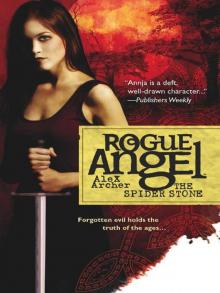 The Spider Stone
The Spider Stone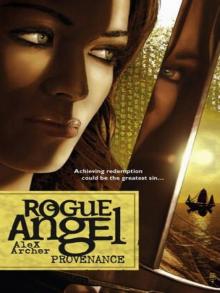 Provenance
Provenance Blood Cursed
Blood Cursed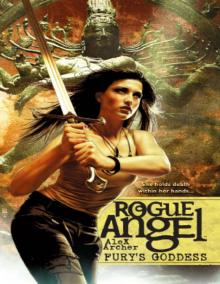 Fury's Goddess
Fury's Goddess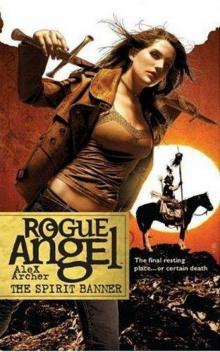 The Spirit Banner
The Spirit Banner Footprints
Footprints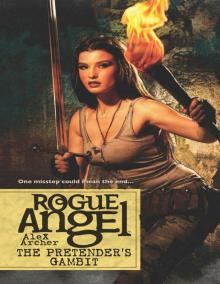 The Pretender's Gambit
The Pretender's Gambit Rogue Angel: The Lost Scrolls
Rogue Angel: The Lost Scrolls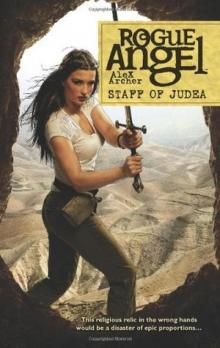 Staff of Judea
Staff of Judea Rogue Angel 55: Beneath Still Waters
Rogue Angel 55: Beneath Still Waters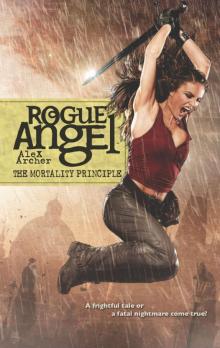 The Mortality Principle
The Mortality Principle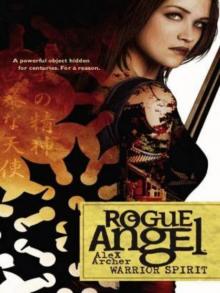 Warrior Spirit
Warrior Spirit Paradox
Paradox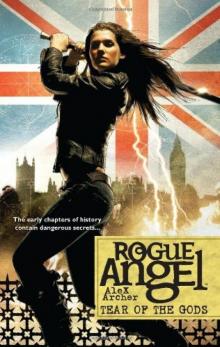 Tear of the Gods
Tear of the Gods Forbidden City
Forbidden City River of Nightmares (Rogue Angel)
River of Nightmares (Rogue Angel)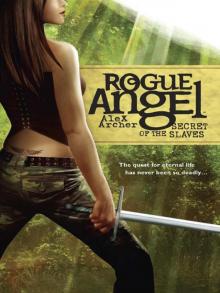 Rogue Angel: The Secret of the Slaves
Rogue Angel: The Secret of the Slaves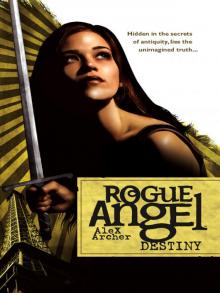 Destiny
Destiny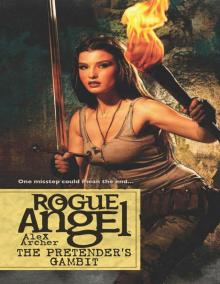 Rogue Angel 51: The Pretender's Gambit
Rogue Angel 51: The Pretender's Gambit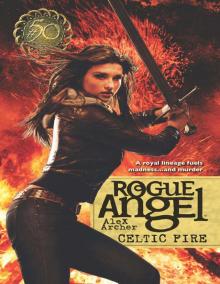 Celtic Fire
Celtic Fire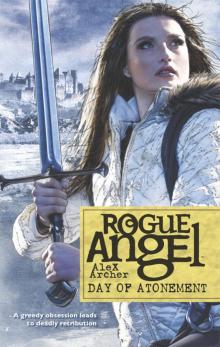 Rogue Angel 54: Day of Atonement
Rogue Angel 54: Day of Atonement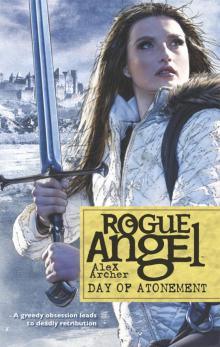 Day of Atonement
Day of Atonement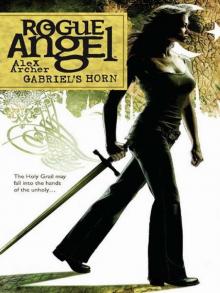 Rogue Angel: Gabriel's Horn
Rogue Angel: Gabriel's Horn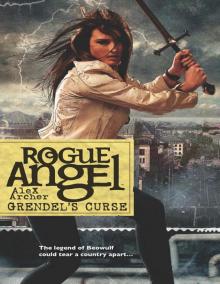 Grendel's Curse
Grendel's Curse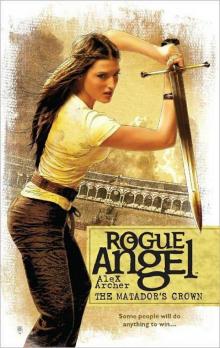 The Matador's Crown
The Matador's Crown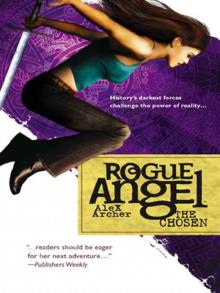 Rogue Angel: The Chosen
Rogue Angel: The Chosen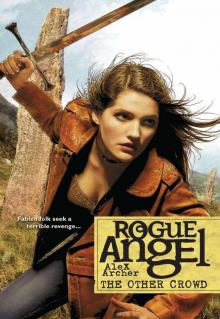 The Other Crowd
The Other Crowd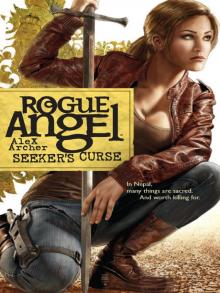 Seeker’s Curse
Seeker’s Curse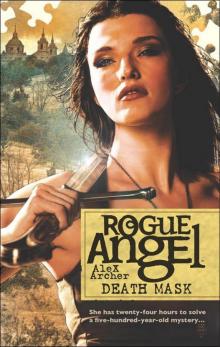 Rogue Angel 52: Death Mask
Rogue Angel 52: Death Mask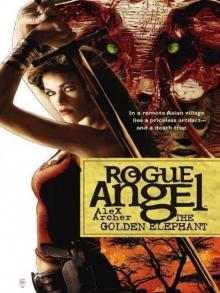 The Golden Elephant
The Golden Elephant Blood Cursed (Rogue Angel)
Blood Cursed (Rogue Angel)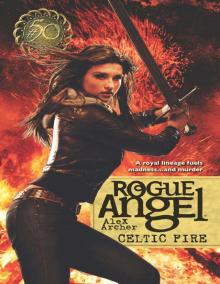 Celtic Fire (Rogue Angel)
Celtic Fire (Rogue Angel)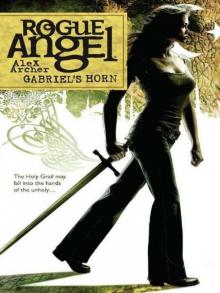 Gabriel's Horn
Gabriel's Horn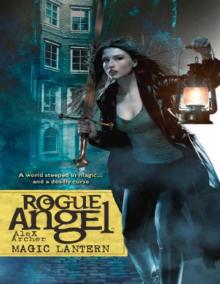 Magic Lantern (Rogue Angel)
Magic Lantern (Rogue Angel) God of Thunder
God of Thunder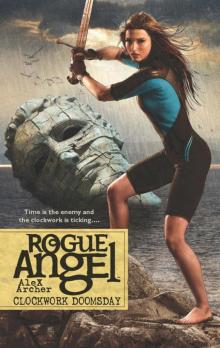 Clockwork Doomsday
Clockwork Doomsday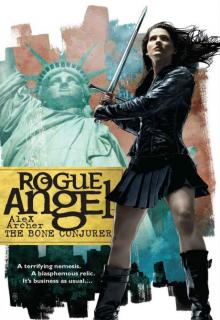 The Bone Conjurer
The Bone Conjurer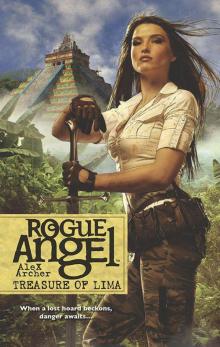 Treasure of Lima
Treasure of Lima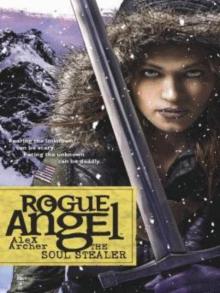 The Soul Stealer
The Soul Stealer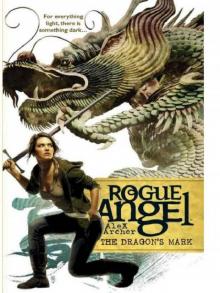 The Dragon’s Mark
The Dragon’s Mark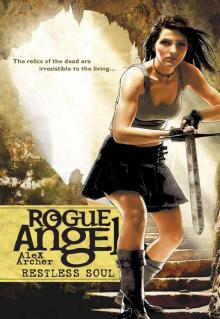 Restless Soul
Restless Soul Rogue Angel: God Of Thunder
Rogue Angel: God Of Thunder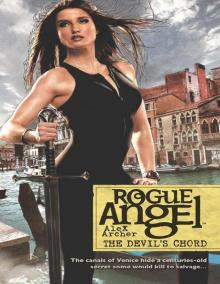 Rogue Angel 49: The Devil's Chord
Rogue Angel 49: The Devil's Chord Death Mask
Death Mask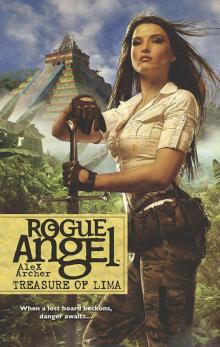 Rogue Angel 46: Treasure of Lima
Rogue Angel 46: Treasure of Lima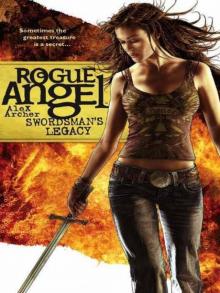 Swordsman's Legacy
Swordsman's Legacy The Oracle's Message
The Oracle's Message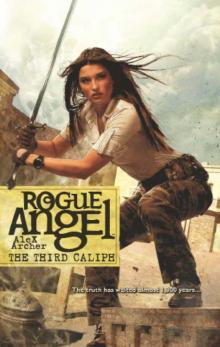 The Third Caliph
The Third Caliph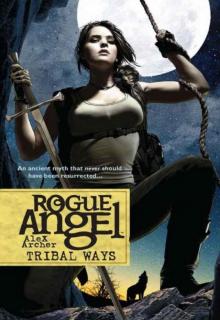 Tribal Ways
Tribal Ways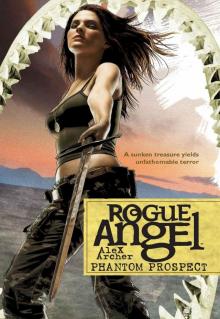 Phantom Prospect
Phantom Prospect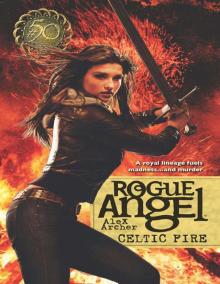 Rogue Angel 50: Celtic Fire
Rogue Angel 50: Celtic Fire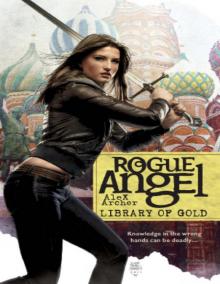 Library of Gold
Library of Gold Rogue Angel 53: Bathed in Blood
Rogue Angel 53: Bathed in Blood Sacred Ground
Sacred Ground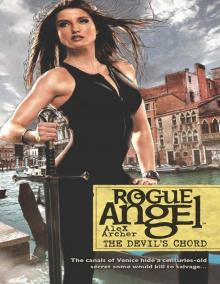 The Devil's Chord
The Devil's Chord Serpent's Kiss
Serpent's Kiss The Vanishing Tribe
The Vanishing Tribe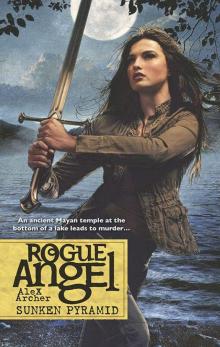 Sunken Pyramid
Sunken Pyramid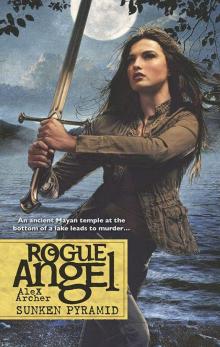 Sunken Pyramid (Rogue Angel)
Sunken Pyramid (Rogue Angel)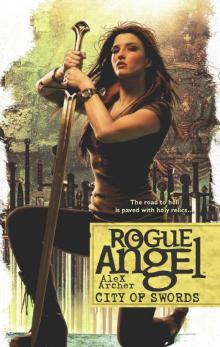 City of Swords
City of Swords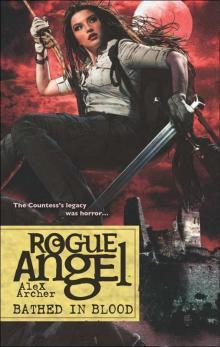 Bathed in Blood
Bathed in Blood The Lost Scrolls
The Lost Scrolls The Babel Codex
The Babel Codex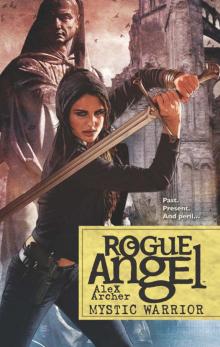 Mystic Warrior
Mystic Warrior Eternal Journey
Eternal Journey Beneath Still Waters
Beneath Still Waters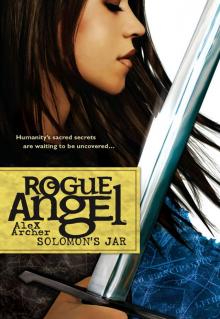 Solomon's Jar
Solomon's Jar Beneath Still Waters (Rogue Angel Book 55)
Beneath Still Waters (Rogue Angel Book 55) Cradle of Solitude
Cradle of Solitude Secret of the Slaves
Secret of the Slaves River of Nightmares
River of Nightmares Polar Quest
Polar Quest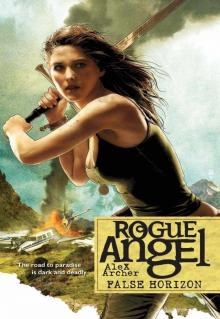 False Horizon
False Horizon